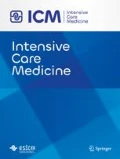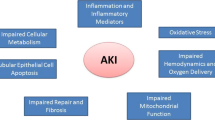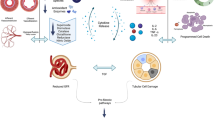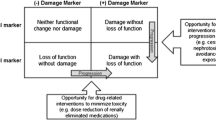Abstract
Introduction
Acute kidney injury (AKI) is a common and serious complication increasing morbidity and mortality from all causes of hospital admission. We have previously shown that AKI decreases midazolam metabolism, a substrate of the cytochrome P450 3A (CYP3A) enzymes and our primary aim was to determine if this effect is dependent on the severity of AKI. We also present preliminary data on the functional impact of different genotypes of CYP3A.
Methods
Critically ill patients at risk of AKI and admitted to a general intensive care unit were categorised after initial resuscitation according to the RIFLE criteria for AKI. Midazolam (1mg) was administered and the serum concentration of midazolam measured at 4 h. Samples were taken for CYP3A genotyping.
Results
Seventy-three patients were assigned to categories R, I and F of the RIFLE criteria or C (controls). Midazolam concentrations (ng mL−1) increased significantly (p = 0.002) as the severity of AKI worsened [control 3.1 (1.4–5.9), risk 4.7 (1.3–10.3), injury 3.9 (2.0–11.1) and failure 6.8 (2.2–113.6)] and were predicted by the duration of AKI (p = 0.000) and γ-glutamyl transferase (p = 0.005) concentrations. Increasing BMI negatively predicted the midazolam concentration (p = 0.001). Preliminary data suggest this effect is diminished if the patient expresses functional CYP3A5.
Conclusion
Increasing severity and duration of AKI are associated with decreased midazolam elimination. We propose that this is caused by impaired CYP3A activity secondary to AKI. The exact mechanism remains to be elucidated. This may have important implications for our drug treatment of critically ill patients.



Similar content being viewed by others
References
James MT, Wald R, Bell CM, Tonelli M, Hemmelgarn BR, Waikar SS, Chertow GM (2010) Weekend hospital admission, acute kidney injury, and mortality. J Am Soc Nephrol 21:845–851
Kolhe NV, Stevens PE, Crowe AV, Lipkin GW, Harrison DA (2008) Case mix, outcome and activity for patients with severe acute kidney injury during the first 24 hours after admission to an adult, general critical care unit: application of predictive models from a secondary analysis of the ICNARC Case Mix Programme database. Crit Care 12(Suppl 1):S2
Tian J, Barrantes F, Amoateng-Adjepong Y, Manthous CA (2009) Rapid reversal of acute kidney injury and hospital outcomes: a retrospective cohort study. Am J Kidney Dis 53:974–981
Bellomo R, Ronco C, Kellum JA, Mehta RL, Palevsky P (2004) Acute renal failure—definition, outcome measures, animal models, fluid therapy and information technology needs: the Second International Consensus Conference of the Acute Dialysis Quality Initiative (ADQI) Group. Crit Care 8:R204–R212
Joannidis M, Metnitz B, Bauer P, Schusterschitz N, Moreno R, Druml W, Metnitz PG (2009) Acute kidney injury in critically ill patients classified by AKIN versus RIFLE using the SAPS 3 database. Intensive Care Med 35:1692–1702
Kociol R, Rogers J, Shaw A (2009) Organ cross talk in the critically ill: the heart and kidney. Blood Purif 27:311–320
Ricci Z, Ronco C (2010) Pulmonary/renal interaction. Curr Opin Crit Care 16:13–18
Hoste EA, De Waele JJ (2005) Physiologic consequences of acute renal failure on the critically ill. Crit Care Clin 21:251–260
Ronco C (2010) Cardiorenal syndromes: definition and classification. Contrib Nephrol 164:33–38
Kirwan CJ, Lee T, Holt DW, Grounds RM, MacPhee IA, Philips BJ (2009) Using midazolam to monitor changes in hepatic drug metabolism in critically ill patients. Intensive Care Med 35:1271–1275
Dowling TC, Briglia AE, Fink JC, Hanes DS, Light PD, Stackiewicz L, Karyekar CS, Eddington ND, Weir MR, Henrich WL (2003) Characterization of hepatic cytochrome p4503A activity in patients with end-stage renal disease. Clin Pharmacol Ther 73:427–434
Dreisbach AW, Lertora JJ (2003) The effect of chronic renal failure on hepatic drug metabolism and drug disposition. Semin Dial 16:45–50
Michaud J, Dube P, Naud J, Leblond FA, Desbiens K, Bonnardeaux A, Pichette V (2005) Effects of serum from patients with chronic renal failure on rat hepatic cytochrome P450. Br J Pharmacol 144:1067–1077
Guevin C, Michaud J, Naud J, Leblond FA, Pichette V (2002) Down-regulation of hepatic cytochrome p450 in chronic renal failure: role of uremic mediators. Br J Pharmacol 137:1039–1046
Finta C, Zaphiropoulos PG (2000) The human cytochrome P450 3A locus. Gene evolution by capture of downstream exons. Gene 260:13–23
Paulussen A, Lavrijsen K, Bohets H, Hendrickx J, Verhasselt P, Luyten W, Konings F, Armstrong M (2000) Two linked mutations in transcriptional regulatory elements of the CYP3A5 gene constitute the major genetic determinant of polymorphic activity in humans. Pharmacogenetics 10:415–424
Fisher MB, Paine MF, Strelevitz TJ, Wrighton SA (2001) The role of hepatic and extrahepatic UDP-glucuronosyltransferases in human drug metabolism. Drug Metab Rev 33:273–297
Paine MF, Khalighi M, Fisher JM, Shen DD, Kunze KL, Marsh CL, Perkins JD, Thummel KE (1997) Characterization of interintestinal and intraintestinal variations in human CYP3A-dependent metabolism. J Pharmacol Exp Ther 283:1552–1562
Ball SE, Scatina J, Kao J, Ferron GM, Fruncillo R, Mayer P, Weinryb I, Guida M, Hopkins PJ, Warner N, Hall J (1999) Population distribution and effects on drug metabolism of a genetic variant in the 5’ promoter region of CYP3A4. Clin Pharmacol Ther 66:288–294
Floyd MD, Gervasini G, Masica AL, Mayo G, George AL Jr, Bhat K, Kim RB, Wilkinson GR (2003) Genotype-phenotype associations for common CYP3A4 and CYP3A5 variants in the basal and induced metabolism of midazolam in European- and African-American men and women. Pharmacogenetics 13:595–606
Fredericks S, Moreton M, MacPhee IA, Mohamed M, Marlowe S, Jorga A, Johnston A, Carter ND, Holt DW (2005) Genotyping cytochrome P450 3A5 using the Light Cycler. Ann Clin Biochem 42:376–381
Mosteller RD (1987) Simplified calculation of body-surface area. N Engl J Med 317:1098
Wandel C, Witte JS, Hall JM, Stein CM, Wood AJ, Wilkinson GR (2000) CYP3A activity in African American and European American men: population differences and functional effect of the CYP3A4*1B5’-promoter region polymorphism. Clin Pharmacol Ther 68:82–91
Hsu CY, Ordonez JD, Chertow GM, Fan D, McCulloch CE, Go AS (2008) The risk of acute renal failure in patients with chronic kidney disease. Kidney Int 74:101–107
Driessen JJ, Vree TB, Guelen PJ (1991) The effects of acute changes in renal function on the pharmacokinetics of midazolam during long-term infusion in ICU patients. Acta Anaesthesiol Belg 42:149–155
Rogers JF, Rocci ML Jr, Haughey DB, Bertino JS Jr (2003) An evaluation of the suitability of intravenous midazolam as an in vivo marker for hepatic cytochrome P4503A activity. Clin Pharmacol Ther 73:153–158
Fragen RJ (1997) Pharmacokinetics and pharmacodynamics of midazolam given via continuous intravenous infusion in intensive care units. Clin Ther 19:405–419 (discussion 367–408)
Wiedermann CJ, Wiedermann W, Joannidis M (2010) Hypoalbuminemia and acute kidney injury: a meta-analysis of observational clinical studies. Intensive Care Med 36:1657–1665
Okorodudu DO, Jumean MF, Montori VM, Romero-Corral A, Somers VK, Erwin PJ, Lopez-Jimenez F (2010) Diagnostic performance of body mass index to identify obesity as defined by body adiposity: a systematic review and meta-analysis. Int J Obes (Lond) 34:791–799
Verbraecken J, Van de Heyning P, De Backer W, Van Gaal L (2006) Body surface area in normal-weight, overweight, and obese adults. A comparison study. Metabolism 55:515–524
MacPhee IA, Fredericks S, Tai T, Syrris P, Carter ND, Johnston A, Goldberg L, Holt DW (2004) The influence of pharmacogenetics on the time to achieve target tacrolimus concentrations after kidney transplantation. Am J Transplant 4:914–919
Thomson SJ, Cowan ML, Johnston I, Musa S, Grounds M, Rahman TM (2009) ‘Liver function tests’ on the intensive care unit: a prospective, observational study. Intensive Care Med 35:1406–1411
Chow PKH, Yu W-K, Soo K-C, Chan STF (2003) The measurement of liver blood flow: a review of experimental and clinical methods. J Surg Res 112:1–11
Swart EL, van der Hoven B, Groeneveld AB, Touw DJ, Danhof M (2002) Correlation between midazolam and lignocaine pharmacokinetics and MEGX formation in healthy volunteers. Br J Clin Pharmacol 53:133–139
Mizushima Y, Tohira H, Mizobata Y, Matsuoka T, Yokota J (2003) Assessment of effective hepatic blood flow in critically ill patients by noninvasive pulse dye-densitometry. Surg Today 33:101–105
Nolin TD, Frye RF, Le P, Sadr H, Naud J, Leblond FA, Pichette V, Himmelfarb J (2009) ESRD impairs nonrenal clearance of fexofenadine but not midazolam. J Am Soc Nephrol 20:2269–2276
Brandi LSMD, Bertolini RMD, Santini LMD, Cavani SMD (1999) Effects of ventilator resetting on indirect calorimetry measurement in the critically ill surgical patient. Crit Care Med 27:531–539
Kurnik D, Wood AJJ, Wilkinson GR (2006) The erythromycin breath test reflects P-glycoprotein function independently of cytochrome P450 3A activity. Clin Pharmacol Ther 80:228–234
Chaobal HN, Kharasch ED (2005) Single-point sampling for assessment of constitutive, induced, and inhibited cytochrome P450 3A activity with alfentanil or midazolam. Clin Pharmacol Ther 78:529–539
Kuypers DR, de Jonge H, Naesens M, Vanrenterghem Y (2008) Effects of CYP3A5 and MDR1 single nucleotide polymorphisms on drug interactions between tacrolimus and fluconazole in renal allograft recipients. Pharmacogenet Genomics 18:861–868
Acknowledgments
The authors would like to thank the St George’s Research Fund for enabling the research to be done and Michelle Moreton of the Analytical Unit for helping us with the genotyping of the CYP 3A enzymes. Dr Christopher Kirwan was involved in the design, the recruitment of patients, collection of data and samples, analysis of data and writing of the manuscript. Dr Iain MacPhee was involved in the design and supervision of the research. Mr Terry Lee developed the midazolam assay and handled the samples. Professor David Holt developed the midazolam assay. Dr Barbara Philips was involved in the development and design of the research, the recruitment of patients, supervision of the study, analysis of the data and writing of the manuscript.
Conflict of interest
None.
Author information
Authors and Affiliations
Corresponding author
Rights and permissions
About this article
Cite this article
Kirwan, C.J., MacPhee, I.A.M., Lee, T. et al. Acute kidney injury reduces the hepatic metabolism of midazolam in critically ill patients. Intensive Care Med 38, 76–84 (2012). https://doi.org/10.1007/s00134-011-2360-8
Received:
Accepted:
Published:
Issue Date:
DOI: https://doi.org/10.1007/s00134-011-2360-8




